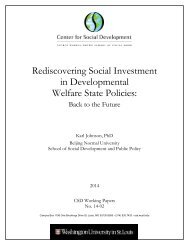Exploring and Assessing Intercultural Competence - Center for ...
Exploring and Assessing Intercultural Competence - Center for ...
Exploring and Assessing Intercultural Competence - Center for ...
Create successful ePaper yourself
Turn your PDF publications into a flip-book with our unique Google optimized e-Paper software.
<strong>Exploring</strong> <strong>and</strong> <strong>Assessing</strong> <strong>Intercultural</strong> <strong>Competence</strong><br />
And the Swiss volunteers:<br />
- will take advantage of the next possible opportunity to get to know other cultures<br />
- pursuing a Masters degree in Spanish literature <strong>and</strong> linguistics (S10)<br />
- international relations (S5)<br />
- course on project management in intercultural fields (S6)<br />
- school <strong>for</strong> health <strong>and</strong> social work (S15)<br />
- political science, general linguistics (S4)<br />
- cultural anthropology (S3)<br />
- now working <strong>for</strong> EIL Ecuador (S9)<br />
- international relations, planning to work <strong>for</strong> an international relief organization (S5)<br />
- development cooperation (S3)<br />
- promotes intercultural programs to people from Ecuador (50 people) (S9)<br />
- teaching language to a woman from Albania (S15)<br />
- husb<strong>and</strong> is Colombian (S6)<br />
- now have many friends, intercultural couples, people from South America (S6)<br />
- new contacts with people from South America (S6)<br />
- want to discover the whole world (that’s why I’m working at the airport) (S10)<br />
- recently conducted a fundraiser <strong>for</strong> scouts (S16)<br />
- have made many new friends (S15)<br />
- now have a third home country (S9)<br />
- planning to carry out my field studies in Ecuador (S1)<br />
- helped to accept a job in the French part of Switzerl<strong>and</strong><br />
Summary<br />
Although the mostly young adult population under study was still too young to have made many<br />
important life choices with regards to career, marriage, <strong>and</strong> life styles, it is evident that they<br />
generally adopted a particular life “orientation” that built on their sojourn in Ecuador. Despite<br />
definitive evidence <strong>for</strong> this assertion at this point due to age, many other important changes of<br />
course did occur, as reported above in Assertion 5 above. Other indicators also pointed to their<br />
current newfound intercultural dispositions, such as:<br />
- interest in further developing language ability<br />
- plans to return/work/stay in South America (6)<br />
- influenced or confirmed decision about career (17)<br />
- mentoring, coaching, welcoming <strong>for</strong>eigners/diversity (5)<br />
- interest in travel, getting to know other cultures (5)<br />
- engaged to or married to a South American (2)<br />
- new friends from South America (4)<br />
Clearly, their interests in learning other languages, <strong>for</strong>eign travel <strong>and</strong> work abroad, meeting<br />
<strong>for</strong>eigners, getting to know other cultures, marrying someone from abroad, <strong>and</strong> wanting to make<br />
new friends from other cultures, were all consistent with individual who have undergone<br />
intercultural experiences <strong>and</strong> were affected in positive ways. No comments suggested retreat or<br />
withdrawal from intercultural contact; all comments pointed in the direction of wanting to exp<strong>and</strong><br />
further what was already experienced.<br />
<strong>Center</strong> <strong>for</strong> Social Development<br />
Washington University in St. Louis<br />
47
















